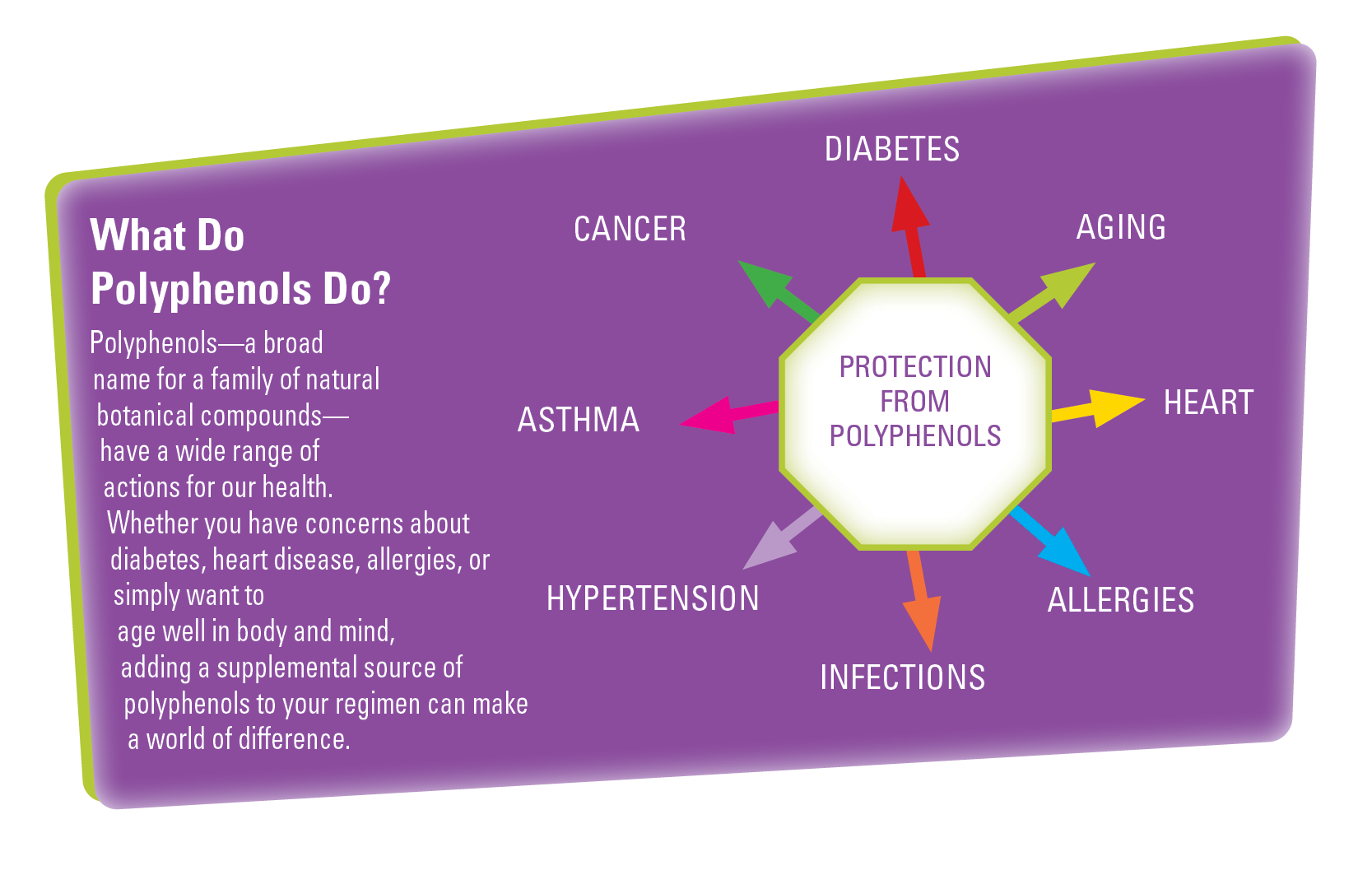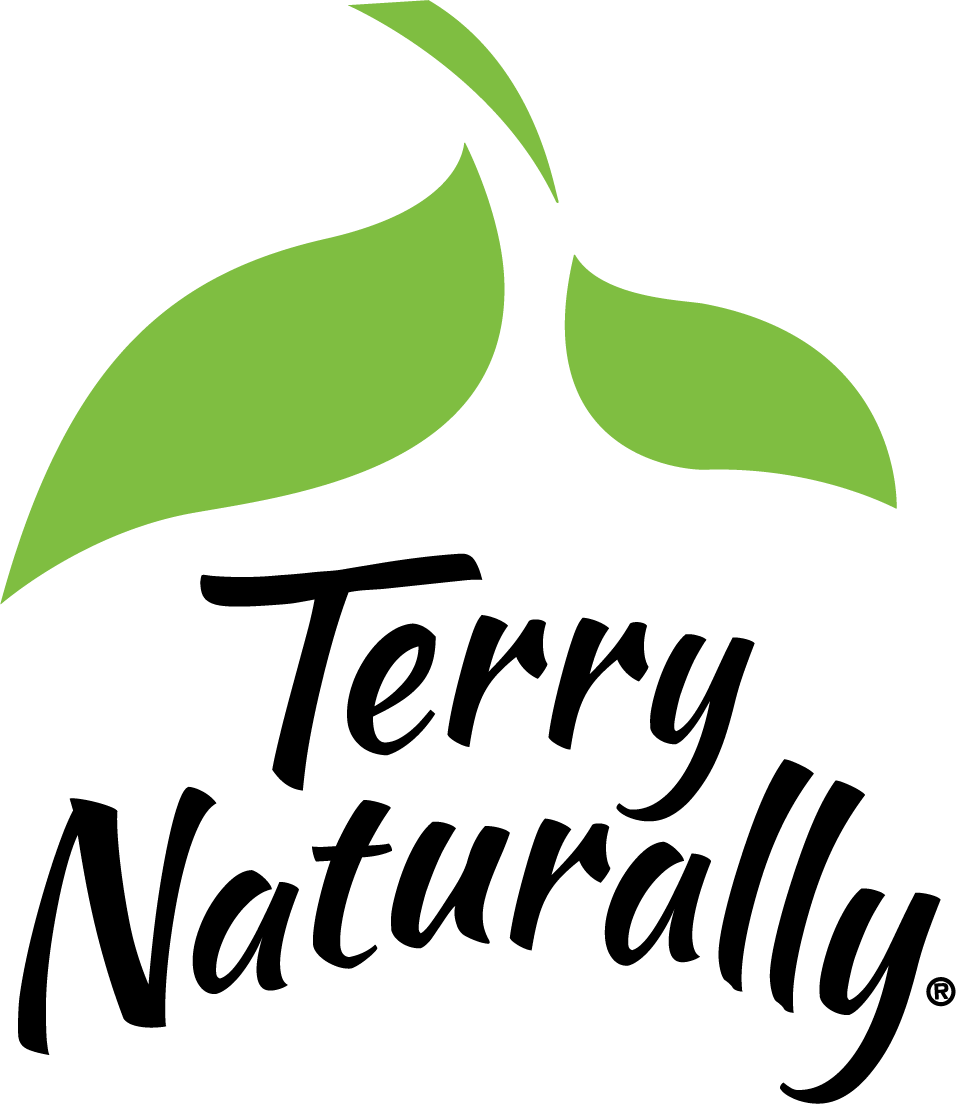The name “polyphenols” is a broad term for many different healthy compounds, including flavones, anthocyanins, catechins, curcuminoids, and phenolic acids. They are the natural compounds that give fruits, vegetables, rhizomes, roots, and flowering herbs their color and protect them from bacteria, insect damage, oxidative stresses, and other threats.
In human diets, polyphenols act as anti-inflammatories, immune-boosters, and DNA-protectors—just to name a few of their attributes.
Ideally, our diets would include a lot of polyphenols with every meal. Experts estimate that we need at least 1,000 mg of polyphenols in our diets each day for optimal wellness. That’s why I think that a supplemental regimen that includes consistent levels of standardized polyphenols is an excellent way to fill in any gaps that may be left behind by less-than-perfect diets.

Here’s a quick look at some of my favorite sources of polyphenols and why they are so important:
Curcumin from Turmeric
Curcumin, the key polyphenol component from the rhizome of the turmeric plant, is what gives curries a distinctive bright orange color. Curcumin has been clinically and scientifically studied. I’ve referred to curcumin as a “do-everything” compound before, and that’s because it truly
does everything.
That said, there are a lot of turmeric and curcumin options out there, so you need to choose carefully.
While turmeric has been part of successful traditional Ayurvedic practice for generations, the absorption of curcumin has been a challenge.
To begin with, there is only about two to five percent curcumin present in turmeric, so getting benefits from the spice form alone could be difficult. Secondly, curcumin is not readily absorbed in the digestive tract, so even standardized 95 percent extracts may not yield results. And adding black pepper extract (piperine) to increase bioavailability could increase the risk of adverse interactions with commonly prescribed medications.
The clinically tested curcumin that I prefer is combined with turmeric essential oil for improved absorption—up to 700 percent—and better blood retention. The turmerones in the oil, especially ar-turmerone, also have anti-inflammatory actions. This curcumin is so effective that it is first choice among researchers for osteoarthritis, rheumatoid arthritis, Alzheimer’s, depression, and cancer. And in several of these studies it either matches or outperforms conventional drugs.
Oligomeric proanthocyanidins (OPCs) from French Grape Seed
Grape seed is especially known for preventing heart disease, because it addresses many concerns: it protects blood vessel walls from free radical damage and prevents the dangerous oxidation of LDL cholesterol. In a randomized, double-blind placebo study, grape seed extract not only moderated blood pressure, but also reduced feelings of stress. In scientific studies, it has been shown to strengthen the structure of joints and bones.
In cancer research, OPCs from French grape seed extract have been found to shrink tumor cells and prevent tumor recurrence.
These OPCs, an especially powerful type of polyphenols, kill cancer stem cells—the “seeds” of tumors that conventional chemotherapy drugs can’t reach. This French grape seed is one that I prefer because it provides a tannin-free source of OPCs, which have a low-molecular weight and are easily absorbed. Its unique characteristics deliver 99 percent polyphenols, so it is an excellent concentrated source of the compounds, which is why it is used in leading research.
Propolis
Propolis is used by bees to help build and maintain their hives. It is rich in compounds that have antibacterial and antiviral actions that help preserve the health of the hive structure and the bees that live there.
Properly filtered to remove waxes and other impurities, propolis is an incredibly effective source of flavonoids and phenolic acids: clinical studies show that propolis can reduce the duration and severity of ear infections and prevent them from recurring or developing into upper respiratory tract infections. It is also effective against antibiotic resistant bacteria, including methicillin-resistant Staphylococcus aureus (MRSA), Candida albicans, and
Streptococcus pyogenes.
Propolis also fights DNA damage that leads to cancerous tumors, liver disease, and other conditions. It boosts the production of natural anti-inflammatory components in the body, and has been shown to improve memory, attention span, and concentration in elderly individuals.
Apples
Apples are excellent sources of a variety of polyphenols, including OPCs. In supplemental use, apple polyphenols are typically extracted from unripe apples, while they are still plentiful in the fruit.
Apple polyphenols have been shown to improve physical endurance and reduce fatigue, reduce abdominal fat, and improve cholesterol levels. They also show impressive results for reducing allergy symptoms, including skin irritation and rashes, inflamed sinuses, and runny noses. Additionally, apple polyphenols have been used in combination with other botanicals, including grape seed extract, for improving men’s libido and sexual performance.
Green Tea
Green tea is already considered one of the world’s healthiest beverages, so much so that its polyphenols, called catechins, are frequently standardized and used in research. One green tea polyphenol in particular, epigallocatechin gallate (EGCG), is often the focus of intensive study.
In terms of healthy aging, green tea is a gold mine: it reduces the effects of photoaging in the skin due to sun
exposure and UV radiation, increases collagen production in the skin, fosters better connections between the hemispheres of the brain, fights bacterial infections, and suppresses inflammatory factors that can lead to Alzheimer’s.
In work on cancer, researchers have found that EGCG from green tea promotes and preserves one of the body’s natural anticancer proteins called p53, so it can make daily repairs to DNA and stop tumors before they start.
Polyphenols are the Perfect Insurance Policy
There are so many things that polyphenols can do, it’s tough to narrow down the list. But I think you can see the value of these incredible nutrients. Physical vigor and stamina, mental focus and well-being, robust immune resistance, and cardiovascular strength are just a few of the ways they help us live with vitality and in an optimal state of excellent health. Much like a multivitamin and mineral formula, adding standardized polyphenols to your regimen every day is one of the best forms of natural insurance that you can invest in.
Getting 1,000 mg of Polyphenols Daily:
Are you eating 14 spinach salads every day? Probably not. Even with a healthy diet, meeting your polyphenol goals may still be a challenge. That’s why an extra supplemental boost can help!
- 5 Bowls of Blueberries
- 6 ½ Apples
- 6 Cups of Green Tea
- 14 Spinach Salads
- 20 Red onions
- 60 Bowls of Cooked Broccoli
To defy your age, I recommend taking Green Tea (Camellia sinensis) Leaf Extract, Apple (Malus spp) Fruit Extract, Bee Propolis Extract, Curcumin (Curcuma longa) Rhizome Extract, French Grape (Vitis vinifera) Seed Extract, providing a great combination of polyphenols.
